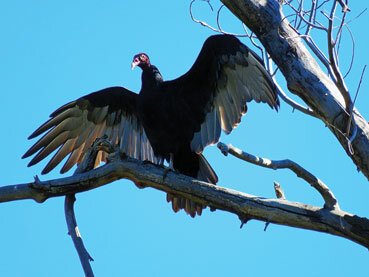
Photo courtesy Charles Martinez
This week’s Bird of the Week, compliments of the Weminuche Audubon Society and Audubon Rockies, is the turkey vulture.
The scientific name of this bird, Cathartes aura, which translates as golden purifier or purifying breeze, evokes a bird of beauty, but some of its habits make it seem less than regal to us.
Take for instance its habit of dining on decaying, smelly meat which we would certainly avoid. Unlike most birds which have a poor sense of smell, the area of the brain used for processing smells is large in this one. Turkey vultures use this heightened sense to locate their dead prey while soaring above the ground. Extremely acidic stomach acid allows them to digest just about anything. They provide an important service to us by taking care of carrion.
We might find a couple more of their habits socially unacceptable. It is not uncommon to see them on a high perch, wings spread to sunbathe and warm up or dry their wings, but when it is too hot, they may pee on their legs for evaporative cooling. The urine also serves to kill bacteria picked up on their feet while feeding. When another bird, animal or human gets too close, a turkey vulture may vomit on it as an act of defense.
The “turkey” in its name is a reference to its naked head like that of a wild turkey. With 6-foot wingspans, these large, dark birds soar on thermal air currents. Long pale “fingers” on their wingtips and bright red heads are distinguishing features. They are often seen soaring in groups and will follow each other to feeding sites. At night they roost together in trees or on other high secluded spots.
Like other scavengers, these birds can suffer from lead poisoning if they ingest shot in carcasses or gut piles left by hunters.
For information on events, visit www.weminucheaudubon.org and www.facebook.com/weminucheaudubon/.